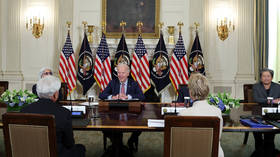Biden convenes advisers to decide AI’s future

US President Joe Biden summoned the President’s Council of Advisors on Science and Technology on Tuesday to discuss the “risks and opportunities” inherent in artificial intelligence. While the president stopped short of calling AI dangerous, he urged tech companies to put in place safety measures to prevent it from causing harm, according to Reuters.
“Tech companies have a responsibility, in my view, to make sure their products are safe before making them public,” Biden said. When pressed by a reporter about whether AI was actually dangerous, however, he backed off, responding, “It remains to be seen. Could be.”
While AI can assist humans in addressing “very difficult challenges like disease and climate change,” Biden said, “it also has to address the potential risks to our society, to our economy, to our national security.”
The purpose of the meeting, according to a White House statement, was to “discuss the importance of protecting rights and safety to ensure responsible innovation and appropriate safeguards.” The president also reportedly called for Congress to pass privacy legislation limiting the collection of personal data, banning advertising directed at children, and prioritizing health and safety in product development.
Last week, the Center for Artificial Intelligence and Digital Policy asked the Federal Trade Commission to prohibit ChatGPT developer OpenAI from issuing new commercial releases of GPT-4, the engine powering the popular chatbot, calling the software “biased, deceptive, and a risk to privacy and public safety.”
The tech ethics group pointed out that the large language model not only exposed users’ private chat histories to other users, but that researchers were able to commandeer the accounts of strangers, peeking at their chat histories and even accessing their billing data without them knowing.
Over 1,000 tech executives, AI researchers, and other experts in the field signed an open letter last month demanding a six-month moratorium on “giant AI experiments” until governments and developers could work out a set of shared safety protocols and controls to prevent the rapidly evolving technology from taking charge of its own destiny in a potentially civilization-ending catastrophe.
Italy banned ChatGPT last month, citing privacy concerns, and a Belgian widow recently came forward blaming an open-source ChatGPT competitor for her husband’s suicide after he developed a relationship with it. The US has yet to impose any binding restrictions on the development of AI.













